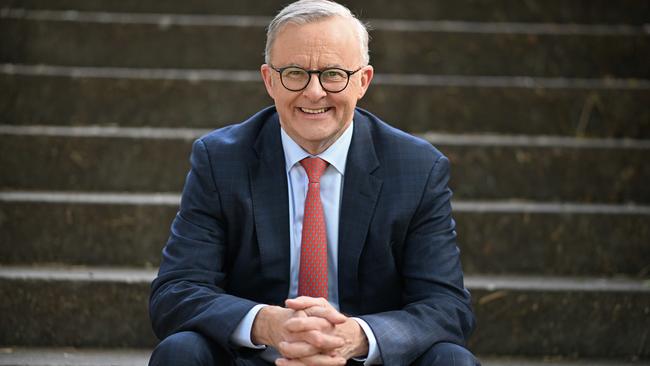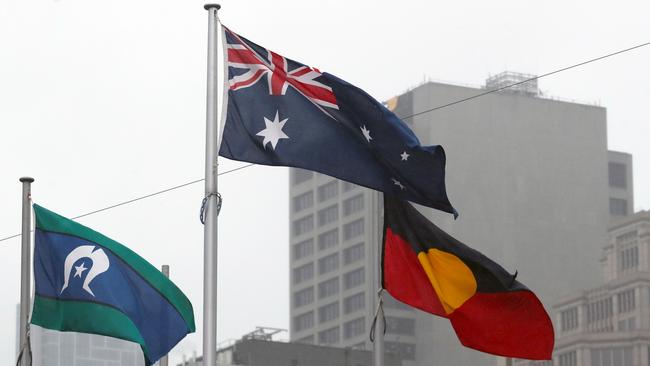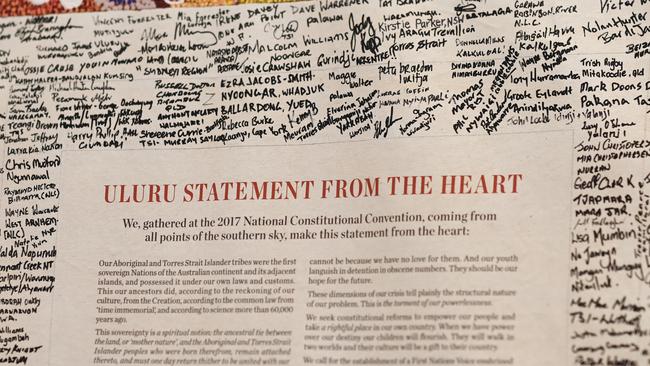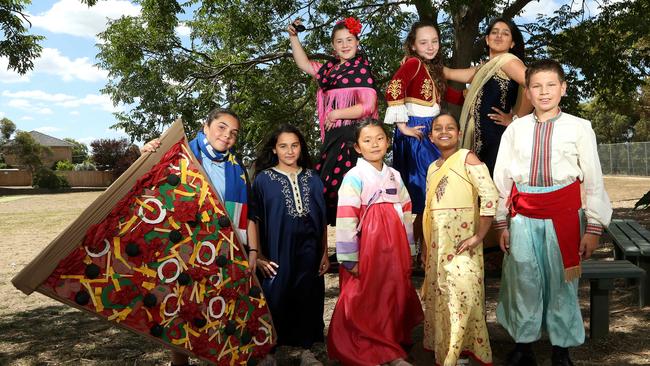Peta Credlin: No vote is a chance to reclaim Australia’s true values
Start to unpack the logic behind the Voice and it runs in conflict to the values of one, equal Australia, writes Peta Credlin.
Opinion
Don't miss out on the headlines from Opinion. Followed categories will be added to My News.
Polling last week showed support for Labor’s constitutionally entrenched Indigenous Voice dropping below 50 per cent for the first time.
For months, the Prime Minister has been pushing his great legacy issue as just a matter of being polite and respectful towards people who’ve been wronged. For him, and for the green-left generally, supporting the Voice is a way of atoning for what they see as the fundamental injustice of Britain settling Australia (as if anyone believes we would be unsettled now, 200 years on, if the British had just sailed by).
But what if the coming referendum turns out to be less a chance for breast-beating and apologising for the remote past, and more a chance for millions of Australians to reassert their faith in our country by rejecting this needless and frankly insulting change.
Because whatever mistakes and injustices might have occurred along the way, as the presence of 11 individual Indigenous voices already in the parliament shows, and as the welcome into Australia of millions of non-English speaking migrants confirms, whatever faults we might have as a country and as a people, entrenched and systematic racism is not among them.
There’s no doubt that there’s an abundance of goodwill toward Aboriginal people and a willingness to go the extra mile to help those trapped in a cycle of substance abuse, dysfunction and domestic violence.

But this is hardly the fault of the taxpayers who fund special services for Aboriginal people to the tune of $30 billion plus each year, and is hardly going to be helped by giving even more say to the same Aboriginal activists who blame all their ills on colonialism rather than bad personal choices and the reluctance of officialdom to demand the same standards of Aboriginal people in terms of going to school, going to work, and obeying the law, as are expected of everyone else.
Since when have we been inclined to defer to the political class, big business, woke billionaires, entitled sports administrators, various legal fraternities with a vested interest in keeping the government onside, and celebrities pontificating on what’s best for us? Australians hate this stuff.

And by trying to rig the debate by refusing to have a constitutional convention, by rushing a parliamentary committee inquiry that ignored numerous critical submissions from former judges, and by trying to bully anyone who wants to donate to the less fashionable ‘No’ side, it only fires up our characteristic support for the underdog.
A lot of what we were previously inclined to accept as small acts of courtesy towards marginalised people, I think, is now starting to grate. Like the ubiquitous acknowledgments of country, as if our own land doesn’t really belong to us. Like the now routine flying of the Aboriginal flag co-equally with the national flag, as if the flag of 4 per cent is as important as the flag of all of us. Like the irritating habit of broadcasters such as the ABC to use Indigenous place names, as if the names by which places have long been known are now only provisional.
People are starting to grasp that the Prime Minister’s Voice project is just the start of something much bigger and even more intrusive, like treaties between the government and the 500-plus separate Indigenous “First Nations” that are thought to have existed in 1788. And like a wholesale rewriting of Australian history from a grievance perspective. After all, “Voice, Truth, Treaty” was the demand of the Uluṟu Statement from the Heart that the PM says the government supports “in full”.

In a foretaste of what’s to come, Aboriginal groups are already starting treaty discussions with some state governments. Last week, one group demanded veto rights on mining and agricultural developments over an area of southwest Queensland almost the size of Tasmania. The relevant Queensland government minister admitted that treaty settlements could involve hundreds of millions of dollars, per treaty, and there’s likely to be 150-plus of them in Queensland.
It’s impossible to say what will flow from a successful Voice referendum, because the government refuses to spell out any of this detail, but it will almost certainly be much more complexity and much more cost in everything to do with land use.
Start to unpack the logic behind the Voice and it’s quite toxic to any concept of one, equal Australia. If an ancestry stretching back beyond 1788 entitles those with it to an extra say over everything government does, how can we keep telling migrants that they are every bit as Australian as the descendants of those who’d come on the First Fleet, or those whose forebears were here 60,000 years ago?

We can’t, because the Voice sets up two classes of Australian – Indigenous and non-Indigenous – and, by implication, it also says that the amount of time your ancestors have spent in Australia determines your “Australian-ness”. Which, of course, flies in the face of our ethos of multiculturalism that says we are all equal as Australians provided we join the team and love our country and its values.
It’s now many decades since there has been any institutional discrimination against Aboriginal people. As almost every large-scale social interaction shows, modern Australians are colourblind. So why should people who have never themselves wronged anyone, be expected to make a collective act of atonement toward others who have never themselves been wronged? Almost nothing would be more destructive of social harmony and global peace than this idea that some must always be making amends to others based on centuries old history.
Earlier, looking at the weight of money and moral intimidation behind the “Yes” campaign, I thought the Voice referendum would most likely leave us permanently divided by race. Now, I think that ordinary Australians will claim their country back by voting it down.
MISCARRIAGE OF GOVERNMENT POWER
The backlash is building against the ACT Labor government’s decision to nationalise Calvary Hospital via legislation rushed through the Territory parliament rather than acquisition by negotiation on just terms.
For more than 40 years, Calvary has been a privately owned and run public hospital, like St Vincent’s in Sydney or Cabrini in Melbourne, providing standard hospital services without charge to everyone who seeks them. In 1978, the Little Company of Mary (a religious order of nuns founded to care for the sick and dying) were given a 125-year lease on the site, but now they’re to be evicted without consultation and without compensation.
At one level, this is an attack on private property from a green-left government with no upper house to act as a brake on executive arrogance. At another level, it’s an attack on the rights of religious entities to act in accordance with their own conscience.
Forget the government’s rationale that it’s about improving health services. No Canberran thinks that Calvary is an inferior hospital to the government-run hospital on the other side of the city. And here’s the proof. Shortly before the announcement, a government-controlled parliamentary committee attacked Calvary for not permitting elective abortions, even though these aren’t carried out at the Canberra Hospital either, and even though Calvary routinely deals with miscarriages.
This week, Peter Dutton challenged the PM, who says his Catholicism is one of the mainstays of his life, to do something about it. Ask yourself, would the ACT government be taking over a Muslim hospital even though many of its views would be the same?
THUMBS UP
Victorian Liberal Party Members: Your walk out yesterday during John Pesutto’s speech was a reminder to every MP that they serve you and the party’s values, and not the Labor-lite zeitgeist that’s infiltrated the leadership in recent years.
THUMBS DOWN
Daniel Andrews and Drag Queen Politics: Leave little kids out of debates about sexuality and queer politics. There’s plenty of retired schoolteachers who would love to read to primary-aged children if that’s what this was really about.
Watch Peta on Credlin on Sky News, weeknights at 6pm





